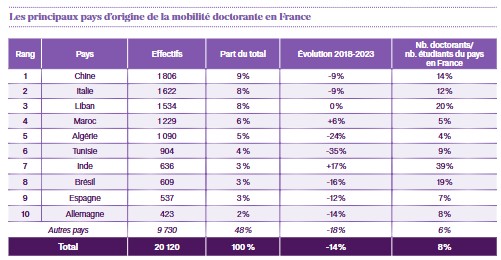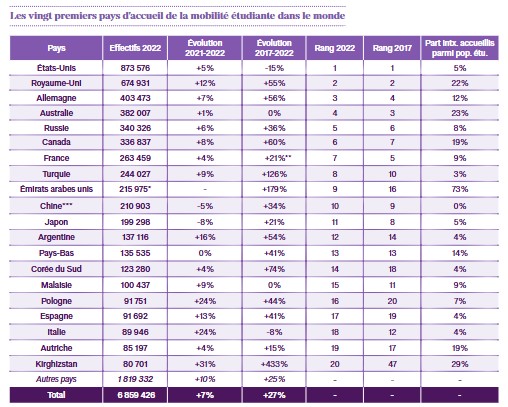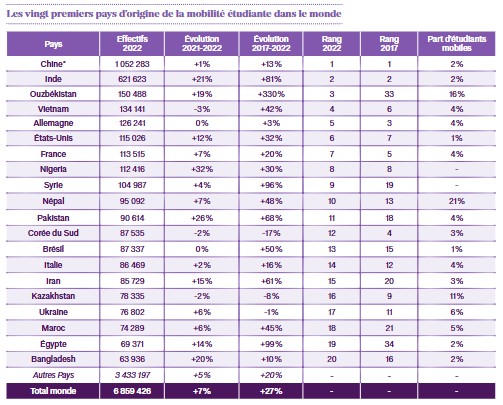

International student mobility is on the rise, reflecting increased competition between major educational powers. France, positioned among the most attractive countries, is seeing its numbers rapidly evolve in the face of major players such as the United States and China. In this article, discover a clear and accessible analysis based on Campus France's 2025 Mobility Figures to better understand France's place in the global context of hosting students and doctoral candidates in 2025.
France in the global landscape: figures and trends in 2024
International doctoral mobility
The global giants of student mobility
France's current position and challenges in global competition
Outlook and strategies for France in 2025
View and download the FULL REPORT [PDF format, in French]
In 2024, France welcomed approximately 430,000 foreign students, representing significant growth (+17% in five years) compared to 2019. This figure, which ranks France seventh in the world, reflects an improving attractiveness, but still lags behind that of the world leaders. For example, the United States, which remains the top choice for international students, welcomes an average of more than 873,000 foreign students, representing approximately 16% of the global flow. China, a major player as a source of mobility, attracts around 324,000 international students, reinforcing its status as a powerhouse in this field.
The recent trend shows that France, despite an often uncertain global context, has recorded remarkable progress, particularly in welcoming PhD candidates, with growth of +21% in five years. This is proof of a strategic positioning, particularly in the field of research and doctoral training, which is an important display of France's influence. The recent increase of international PhD candidates numbers shows that France remains a credible destination for high-level young researchers, particularly from Europe and Africa, but still faces strong competition.
 Main countries of origin of international PhD candidates in France
Main countries of origin of international PhD candidates in FranceThe majority of foreign PhD candidates in France come from Asia (31%), particularly China (10,000 students in 2023-2024), followed by the Maghreb (Morocco, Algeria, Tunisia) with 28%. European countries also account for a significant share, with Germany, Italy, and Romania. The growth in the number of PhD candidates from sub-Saharan Africa (+34% in five years) and Europe (+21%) shows diversification. However, the decline in the number of visa applications from Algerian students (-23% in 2024) could slow these flows. France remains an attractive destination thanks to its renowned universities, but international competition is fierce.
The dominant disciplines with over 80% of PhD candidates are studying fundamental sciences, medicine, or engineering. 79% are enrolled in public universities while remaining 21% are enrolled in engineering schools or research organizations. Basic sciences account for nearly one-third of foreign PhD candidates, mainly in multidisciplinary institutions. However, the proportion of PhD candidates in the social sciences and humanities remains moderate, highlighting a need for diversification to enhance overall attractiveness.


 The key players and their dynamism
The key players and their dynamismThe research and doctoral sector is a strategic category for these countries, as it guarantees international influence and a flow of knowledge and collaboration. In 2022, the majority of international doctoral students were hosted by the United States (31%), followed by the United Kingdom (11%), Germany (7%) and France (6%). The growth of this population, which is now rising sharply (+21% in five years), is a key indicator for measuring a country's ability to attract future researchers and innovators.
 France, a growing player but still lagging behind the leaders
France, a growing player but still lagging behind the leadersBetween 2017 and 2022, France saw a 21% increase in the number of international students enrolled, compared to +56% for Germany and +55% for the United Kingdom, figures that are significantly higher than the French increase (p. 6 and 12). Despite an ambitious internationalization policy, France continues to lag behind its main European competitors.
Major host countries, such as the United Kingdom, Germany, and Canada (+60% over the period 2017–2022), have all experienced growth of over 50% thanks to strategies to open up and facilitate stays for foreign students (pp. 6 and 12). France must continue its efforts to remain competitive, in particular by simplifying procedures, strengthening its international partnerships, and promoting its areas of excellence.
While countries such as the United States (-15% over the same period) and Australia (+0%) experienced a slowdown or stagnation, France managed to maintain stability by remaining largely open during the pandemic (p. 6-7). To further boost its flows, an ambitious policy focused on research, training, and simplifying procedures remains necessary.
The numbers point to fierce competition in the years ahead. France must adopt a proactive strategy to promote its academic excellence, develop its international networks, and simplify its enrollment and residency procedures for foreign students. Specific programs to attract PhD candidates, researchers, and long-term exchange students need to be put in place and strengthened.
By 2025, important challenges will arise: attractiveness must be considered from a multi-dimensional perspective, incorporating not only reception but also:
France must also continue to build on its centers of excellence in research, training, and innovation to raise the profile of its universities worldwide. European collaboration, particularly with the Schengen area, represents an opportunity to be seized in order to expand its partnerships.
Maintaining strong appeal is not just a question of quantity; it is also a strategic issue of development, innovation, and influence. Foreign students and researchers contribute to the vitality of universities, promote French culture and science worldwide, and bring positive effects to the French economy and society.
With its strong academic history, recognized quality of education, and scientific excellence, France remains a major player on the global academic scene. But in a context of increased international competition, attractiveness is never acquired: France must therefore nurture a renewed ambition for hospitality, openness, and innovation. By continuing to:
This will allow it to consolidate its position among the world's leading academic nations, while making international mobility an asset for its research, economy, and global influence.